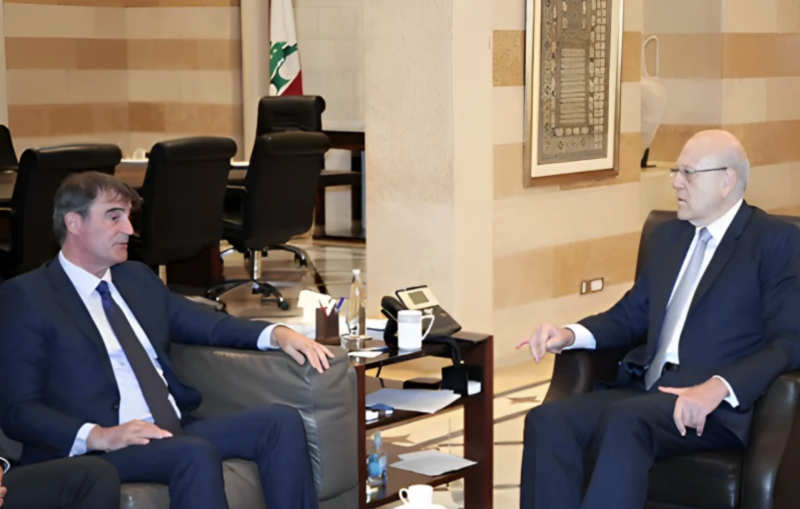
Outgoing Prime Minister Najib Mikati receiving IMF Head of Mission for Lebanon Ernesto Ramirez Rigo at the Grand Serail, Monday May 20, 2024. (Credit: National News Agency)
No big surprises were expected from the IMF delegation’s visit to Lebanon. The delegation had arrived in Beirut on Sunday night.
IMF head of mission for Lebanon Ernesto Ramirez Rigo led the delegation and noted that no significant progress was made regarding the reforms required to qualify Lebanon for a potential aid program.
After three days of talks with senior officials, MPs, bank executives and private sector representatives, the experts left on Thursday without holding a press conference. They issued a press release yesterday including a clear statement of the situation, with a few things left unsaid that could be understood between the lines.
Aiming for a balanced 2025 budget
The delegation deplored in its press release that “the lack of action on necessary economic reforms continues to exert a heavy toll on Lebanon’s economy and population.”
“Unemployment and poverty have reached exceptionally high levels and the delivery of critical public services has been severely disrupted,” it added.
The country “continues to struggle with hosting the largest number of refugees per capita in the world, amidst limited resources” which has exacerbated the situation.
In addition, “the negative spillovers from the war in Gaza and the fighting at Lebanon’s southern border” displaced around 100,000 people, caused damage to the agriculture and trade in south Lebanon and threatened the tourism season.
The IMF also considers Banque du Liban’s and the Finance Ministry’s efforts to unify the exchange rate, end the dwindling foreign currency reserves and control the money supply in lira as insufficient.
“Progress on other critical reforms, including governance, transparency and accountability, remains limited,” it added. The “weaknesses in the quality, availability and timeliness of economic data pose challenges for informed policymaking.”
The IMF delegation welcomed the timely approval of the 2024 budget but stated that there are far more critical objectives. They especially include approving the 2025 budget law on time, with a balanced budget that does more than simply slash public services and gives the administration the means to combat tax evasion effectively.
The delegation reiterated that restructuring the banking sector and addressing the losses that exceed $70 billion while “protecting depositors to the maximum extent possible and limiting recourse” to state assets are “indispensable to lay the foundation for economic recovery.”
The delegation concluded its statement by saying that the delay in implementing reforms does not call into question the IMF’s commitment to support the country, suggesting that the terms of the staff-level agreement signed in April 2022 still stand, even if they may be updated.
The IMF is expected to send its teams back to Beirut in September, this time as part of a mission to assess the economic well-being of its member states, as provided for under Article IV of its Articles of Agreement.
Recovery is not just around the corner
There are several things the IMF didn’t say that can be extrapolated from this press release.
Firstly, the IMF did not provide a forecast for Lebanese GDP or any other macroeconomic indicator in 2024 because of the many uncertainties that could affect it. Many factors — including possible developments in the situation in Gaza and south Lebanon and the progress concerning reforms in Lebanon — could change the situation.
The IMF has refrained from projections since the crisis broke out in Lebanon, unlike the World Bank, which anticipated in its April report that the country will achieve an economic growth of 0.5 percent in 2024.
It is also quite clear that the IMF did not advocate, after a four-and-a-half-year crisis during which the GDP was halved, the passing of a 2025 budget law that achieves growth. Rather, it insisted that the next budget must achieve a “zero deficit,” irrespective of the other reforms that should be implemented.
In any case, the government cannot plan a stimulus budget, given that it can no longer borrow money from technically bankrupt Lebanese banks or foreign investors, given that the country has remained in default on its foreign debt since March 2020 and has yet to restructure it.
The IMF's priority remains to remedy the country’s liabilities and install a viable fiscal policy. As its representatives pointed out on several occasions, the $3 billion loan program will only serve to cover the financial cost of these operations. Selecting a fiscal policy, the exchange rate regime to be adopted or the public investment projects to support as a priority is not within its remit.
Moreover, the IMF stressed that the development and predominance of the informal, cash-based economy will raise “significant regulatory and supervisory concerns.”
In other words, the IMF suggested that since nothing has been done to restructure the Lebanese banking sector, the country’s chances of escaping the Financial Action Task Force were reduced. The latter granted the Lebanese financial sector a one-year grace period which will expire next month.
The international financial crime watchdog must decide whether the country’s regulations meet international standards or if it should be downgraded to the watch list. However, the apparent lack of progress over the past year suggests that the country will not escape being downgraded for a second year unless something exceptional happens.
This article was originally published in L'Orient-Le Jour. Translated by Joelle El Khoury.